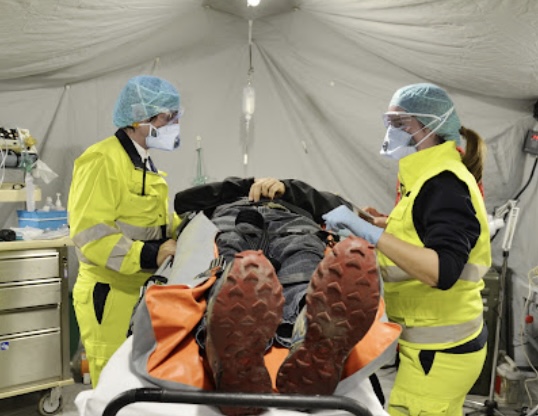Hospitals are the ultimate providers of healthcare services. However, sometimes, patients may not have access to them when in need, perhaps, because of their location, or a calamity strikes and they get destroyed. Such things can limit people from getting the immediate help they need and, worse, could even lead to death. That’s why there’s a need to have mobile field hospitals. They’re not permanent, but can be a viable solution in times of emergency. They’re also highly flexible and can be quickly set up no matter where they’re needed.
With such deployable field hospitals, healthcare providers can quickly rescue patients, especially during a disaster, such as natural calamities, like typhoons, hurricanes, tornadoes, floods, or earthquakes, or infectious disease outbreaks, like measles, influenza, or Ebola. With that in mind, below are six reasons why healthcare organizations should invest in mobile field hospitals.
- Brings Solutions In Moments Of Need
After a disaster, mainstream hospitals usually become too crowded with patients needing help. Some may need urgent assistance, but because of the small number of hospitals, they can’t accommodate them. For this reason, healthcare organizations need to invest in mobile health clinics. Most of them are air-conditioned and self-contained, and provide patients with the care they need in a sterile and secure environment.
These quickly accessible clinics have modern medical equipment, such as:
- Surgery room: A patient won’t have to get to the hospital to undergo an operation because it can be quickly done on the field.
- Children’s ward: A pediatrician can look at a child and give them a diagnosis or prescribe the right medication.
- Mental health clinic: Mental health problems can be handled efficiently at a field hospital instead of a patient going to the local hospital, which may be far.
- Maternity wing: This can assist women in giving birth. Babies can be delivered quickly, avoiding complications.
These are a few examples of services healthcare organizations can provide to their patients from wherever they are, no matter the pain they’re in, whether it’s a dental emergency or a traumatic injury. Nobody has to drive to crowded hospitals to seek the treatment they need.
- Decreases Logistics
Using a deployable medical hospital enables a healthcare organization to save on transportation costs. For large-scale disasters, there may be many victims affected, and ferrying them all to a faraway hospital could be time-consuming and expensive. But, with a deployable field hospital, any healthcare organization can provide on-site, real-time services, decreasing the number of casualties.
- Ensures Continuity Of Patient Care
In cases of outbreaks, hospitals are fully packed, and when patients feel a little bit better, they’re told to go home even if they’re yet to fully recover. However, when there’s a mobile field clinic, the hospital can transfer the said patients to such a setup. They have enough beds and offer quality personalized attention. They also have enough space, streamlining operating logistics.
- Allows For Easy Screening And Vaccination
With busy work schedules, it takes a lot of time for full-time workers to leave their jobs and travel to hospitals to get a vaccine and the like. Thus, they may completely do away with the idea of getting one. However, vaccinations are important and are developed to prevent diseases. Similarly, screening is also essential.
Medical field hospitals take these services near to where they’re needed. These can be set up next to a commercial building hosting several companies and vaccinate all staff at once. They can get vaccine shots quickly, as well as get screened for cancer, high blood pressure, hypertension, and other illnesses.
- Ensures Adequate Preparation For Disasters
Even though disasters are unpreventable, knowing how to manage them can help save many people’s lives. With enough deployable clinics, healthcare workers can also work effectively because they won’t feel overwhelmed. It’s best to have medical field hospitals on standby so that when an emergency occurs, it’s only a matter of where the clinics are to be set up.
- Provides Workers With Respite Spaces
Healthcare organizations can set up smaller medical shelters, providing their staff with a place to rest. If they had to deal with numerous patient deaths or stay away from loved ones, it can cause them to be physically and mentally tired. Thus, a place of respite will be greatly appreciated by these healthcare workers. Here, they can take their well-deserved break after long shifts, meditate, or have casual chitchats with their colleagues. These can encourage healthcare workers to provide excellent services to patients.
Conclusion
Investing in mobile field hospitals provides healthcare organizations with numerous advantages, such as cost savings, providing immediate care to patients in times of emergency, and allowing for utmost preparation for any disaster. Meanwhile, they allow patients to have easy access to the healthcare services they require at any point in time.
